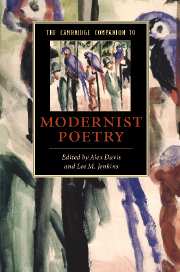Book contents
- Frontmatter
- Introduction
- Part I: Contexts
- Part II: Authors and Alliances
- 5 Pound or Eliot: whose era?
- 6 H.D. and revisionary myth-making
- 7 Yeats, Ireland and modernism
- 8 Modernist poetry in the British Isles
- 9 US modernism I: Moore, Stevens and the modernist lyric
- 10 US modernism II: the other tradition - Williams, Zukofsky and Olson
- 11 The poetry of the Harlem Renaissance
- 12 Caliban’s modernity: postcolonial poetry of Africa, South Asia and the Caribbean
- Part III: Receptions
- Guide to further reading
- Index
- Series List
8 - Modernist poetry in the British Isles
from Part II: - Authors and Alliances
Published online by Cambridge University Press: 28 November 2007
- Frontmatter
- Introduction
- Part I: Contexts
- Part II: Authors and Alliances
- 5 Pound or Eliot: whose era?
- 6 H.D. and revisionary myth-making
- 7 Yeats, Ireland and modernism
- 8 Modernist poetry in the British Isles
- 9 US modernism I: Moore, Stevens and the modernist lyric
- 10 US modernism II: the other tradition - Williams, Zukofsky and Olson
- 11 The poetry of the Harlem Renaissance
- 12 Caliban’s modernity: postcolonial poetry of Africa, South Asia and the Caribbean
- Part III: Receptions
- Guide to further reading
- Index
- Series List
Summary
Mina Loy's poem 'Brancusi's Golden Bird' was first published, next to a photograph of Brancusi's sculpture, in the same 1922 issue of the Dial as T. S. Eliot's The Waste Land. If The Waste Land has become familiar as a pivotal text in the institutionalisation of Eliot, Loy's poem remains unassimilated, still suggestive for what might become of twenty-first-century neomodernism. 'Brancusi's Golden Bird' is one among several poems in which Loy finds analogues and affiliations in the persons and works of her contemporaries. Elliptical and witty, these poems carve out transfers of energy from language used as an imagistic mode of description to a more synthetic, aesthetic compound. Combining free-verse forms, vowel over consonant patterns, with a sense of the play of concretion on the page, her poems have a sculptural and musical palpability. 'Brancusi's Golden Bird' moves from what might seem like a representation of another medium towards a poetics whose delight in Latinate concretion sits deftly across line breaks and intimations of a new silence in writing:
an incandescent curve
licked by chromatic flames
in labyrinths of reflections
This gong
of polished hyperaesthesia
shrills with brass
as the aggressive light
strikes
its significance
The immaculate
conception
of the inaudible bird
occurs
in gorgeous reticence
- Type
- Chapter
- Information
- The Cambridge Companion to Modernist Poetry , pp. 147 - 162Publisher: Cambridge University PressPrint publication year: 2007
- 1
- Cited by



